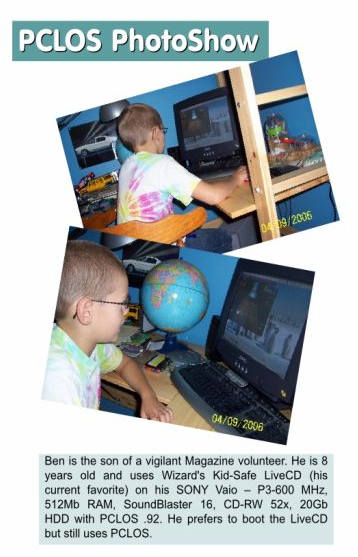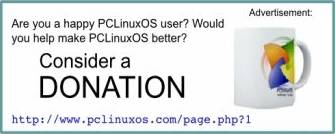The Freedom We Share
by Merlin Whitewolf
FOSS, Free and Open Source Software, is something we share. That is, for every application that is released as open source, there is an available source code. To this source code, you may add tweaks, plugins, functions, etc., or you may rewrite it to make something that could be considered a new program. This is the freedom that most people speak of when freedom in software is discussed. It is a very important freedom, beyond doubt, as it encourages improvements and new development in software. There is another dimension to this freedom. That is to share the freedom itself.

Freedom that is held tightly loses its value and becomes proprietary. The sharing of freedom needs to be as free as the access to source code for it be be complete. When we share freedom, we are doing much more than giving access to code: we are giving access to a way of life and a philosophy.
It may be hard for those who see everything in terms of ownership, but if our creations, as well as our creativity, are not shared freely, we lose, rather than gain. The software creator is an artist. Some creators proceed to lock away their creation as "Intellectual Property" that must be protected. Others willingly open their code to show their creativity.
You can find both views in the world of software creation. The difference between the two is that the proprietary creator feels the need to own his/her creation, while the open source creator owns his creativity. Owning a creation, especially after it has been passed on to another person, creates a denial of rights and freedoms. Sharing your creativity creates an atmosphere of freedom in which, from the most minor to the most major, additions can be seen as an act of free creativity.
When a new house is built, the builder does not say to the buyer, "You may never make any alterations to this house. It may not be painted. No rooms may be added. No fixture may be replaced with newer or different ones. And you may never resell this house." If the builder said these things, the average home buyer would begin to look elsewhere for their housing needs. Customizing our homes to meet our needs and tastes is seen as an expected part of home ownership, as well as the right to resell.

In the software industry, we encounter those who wish to retain ownership and tight control over their applications. For them, the code must be locked down or they will lose, and preventing a resale is a must. To allow either of these may remove a source of income. The more times they can sell the software, via a license, the greater the profit they can have.
In the open source world, the outlook is entirely different. If the software is good and useful, one may purchase a service contract or make donations to the developer. This encourages keeping the software at as high a level of usefulness and quality as possible. Anyone may make additions or changes and share those additions or changes, as each creator owns only his/her creativity; everything else is shared with everyone who chooses to have a look. The changes that were made may bring greater value to the software and make it more usable for more people. It then becomes a new work that is based on the older one. This new work may be as simple as a new version under the same name, or if the differences are great enough, it may be released as a new application.
Any piece of artwork, after it is completed, may be viewed by anyone who comes into contact with it. The brush strokes of the artist may be seen and copied, learned from and emulated and may encourage or inspire some new creation. When a beautiful piece of art is locked away, so that no one may view it, all of those that could have been inspired by it have lost that opportunity to create. In such cases, we have all lost. We lose not only the viewing of the original but the new creations it could have inspired.
The reason for locking away such works may be greed or fear. It may be for some monetary consideration. The reasons for it are not as important as the loss. Greed, etc., may keep one person's wallet fuller, but it does nothing for the creation and sharing of the art. Some important new work may never occur or be long delayed, when we suffer the loss of the choice to view.
No artist that I'm aware of has ever gained by locking away his/her creativity. For any artist to truly gain, the artwork must be viewed. That is, the freedom to create, when brought together with the freedom to view and enjoy, brings the artist a gain. This is the way artistic reputations come about and are maintained. The greater and more deserved the artist's reputation, the higher his/her status and income potential becomes.
So, what does all of this have to do with the sharing of freedom? Think about it a moment: if you do not give the freedoms that you enjoy to others, have you gained your own freedom? Or have you bound yourself to a label of freedom without stepping outside of the locked up world of ownership?
Freedom isn't truly freedom until you have passed it on. We share our freedom, or we lock ourselves away and hide behind the bindings we place on ourselves.
In conclusion, let's share our freedom. In so doing, we become more free.
